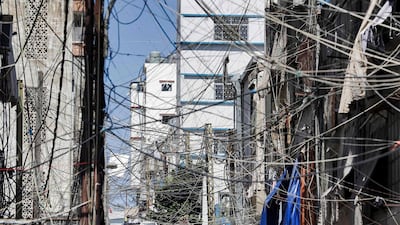Paul Naggear is in many ways the opposite of an average politician in Lebanon. And for tragic reasons, he has proven something of a rallying figure for those opposed to the country's increasingly corrupt leaders. After his three-year-old daughter was killed in last year's catastrophic blast at Beirut’s port, images of the pair walking through the city streets in 2019 at a protest against corruption went viral in her memory. A television interview with Mr Naggear after Alexandra's death, in which he accused those in positions of power of criminal negligence, was also beamed far and wide. It was a harsh reminder that those whose lives were torn apart after the blast were largely powerless to do anything about it.
Less than a year later, Mr Naggear has won preliminary elections at Beirut's Order of Engineers and Architects, a professional body that has played an important role in rebuilding the city at a time when the government has struggled to do so. His is a small, but significant victory and it could mark an early stage in the long road towards ordinary citizens such as himself regaining a political voice. Importantly, secular and civic-minded candidates won a majority of votes cast in the elections.
There have been other elections of professional bodies within pockets of civil society that have demonstrated a hunger for genuine political participation. Last year, independent candidates won a number of positions across three of the country's main universities: the American University of Beirut, the Lebanese American University and Rafik Hariri University. The votes have traditionally been dominated by the main political parties, and are considered a strong indication of how young people would vote in national elections.
Sunday’s elections at the architectural body also saw landslide victories for independent candidates and opposition groups, many of them women. Turnout was reported to have been much increased from the previous vote.
Mr Naggear and his newly elected peers are pursuing one of the few democratic avenues that are still open to ordinary Lebanese, offered by some of the country's older institutions that, reassuringly, appear to have not yet been inflicted with the same ineffectiveness as the country's government.
Successful candidates at this week's vote are not becoming legislators, but there are hopes that such victories could be evidence of a meaningful wave of Lebanese people coming together to rise above traditional political factions, and become part of a new movement that keeps the prospect of a better future alive.
For years, those who want a just and prosperous country have been unable to jolt the political class into action to serve Lebanon. Scepticism that this minor win will bring any progress is, therefore, justifiable. Little has changed during the past few years, even as world leaders have threatened sanctions, independent inquiries have been launched into failing arms of the state, and as waves of mass protest swept the country. But in the middle of Lebanon's crises, moderate victories like these show the strength of civil society and the possibility for citizens to make a difference. At the very least, the win at the Order of Engineers and Architects is an example of how ordinary Lebanese people can register their discontent.


